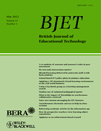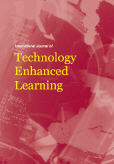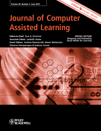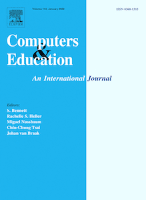
EDUCATIONAL TECHNOLOGY & SOCIETY
Scope & Guideline
Pioneering Research that Shapes the Future of Learning
Introduction
Aims and Scopes
- Integration of Technology in Education:
The journal explores how technology can be integrated into various educational contexts, focusing on tools such as mobile applications, virtual reality, and gamification, to enhance teaching and learning processes. - Self-Directed Learning:
A significant emphasis is placed on self-directed learning, investigating how technology can support learners in taking charge of their own educational journeys, including the development of self-regulation and metacognitive skills. - Learning Analytics and Data-Driven Insights:
Research published in the journal often involves learning analytics, utilizing data to assess and improve educational practices, and to understand student behaviors and learning patterns. - Teacher Professional Development:
The journal addresses the professional growth of educators, discussing strategies for enhancing teachers' technological competencies and pedagogical approaches to integrate technology in their classrooms. - Multimodal and Collaborative Learning:
The focus extends to multimodal learning environments that facilitate collaboration among students, utilizing various forms of communication and interaction to enhance the learning experience.
Trending and Emerging
- Artificial Intelligence in Education:
There is a growing focus on the application of AI technologies in educational settings, including personalized learning systems and intelligent tutoring, highlighting the potential of AI to enhance educational outcomes. - Gamification and Game-Based Learning:
The trend towards gamifying educational experiences is evident, as research explores how game principles can motivate students and improve learning engagement and outcomes. - Mobile Learning and Ubiquitous Learning Environments:
The increasing accessibility of mobile devices has led to a surge in studies examining mobile-assisted learning, emphasizing how education can occur anytime and anywhere, which is particularly relevant in post-pandemic contexts. - Social Justice and Equity in Education:
Emerging themes also include a focus on addressing educational inequities and the digital divide, particularly in how technology can support marginalized groups and enhance access to quality education. - Mindfulness and Well-being in Learning:
Research is increasingly addressing the intersection of technology, mindfulness, and student well-being, recognizing the importance of mental health in educational success and the role of technology in supporting these aspects.
Declining or Waning
- Traditional Classroom Pedagogy:
There is a noticeable decline in research focused solely on traditional teaching methods without the incorporation of technology, as the field increasingly favors innovative and tech-integrated pedagogical approaches. - Basic Digital Literacy:
As education technology becomes more sophisticated, foundational studies on basic digital literacy skills are less frequently addressed, indicating a possible shift towards exploring more complex digital competencies. - Non-Interactive Learning Environments:
Research centered on passive learning experiences, such as lecture-based formats without interactive elements, has diminished, as the emphasis shifts towards active learning strategies that engage students.
Similar Journals

International Journal of Mobile Learning and Organisation
Transforming Education Through Mobile InnovationInternational Journal of Mobile Learning and Organisation, published by InderScience Enterprises Ltd, is a premier academic journal focused on the intersection of mobile technology and educational practices. With an ISSN of 1746-725X and an E-ISSN of 1746-7268, this journal has been a vital resource since its inception in 2007, exploring innovative approaches to mobile learning and organizational development with a converged publication timeline extending to 2024. The journal holds a respectable impact in various disciplines, categorized in Q3 for Computer Science Applications and Q2 for both Education and E-learning as of 2023, showcasing its relevance in critical academic discussions. Ranked in the 75th percentile for Educational Social Sciences and the 52nd percentile in Computer Science, it serves as a bridge for researchers, professionals, and students eager to advance their understanding and application of mobile learning techniques. Although it does not provide open access, the journal is recognized for its rigorous peer-review process, ensuring the publication of high-quality research that contributes to the landscape of educational technology.

Research and Practice in Technology Enhanced Learning
Exploring the intersection of technology and learning.Research and Practice in Technology Enhanced Learning is a leading international journal dedicated to advancing the field of educational technology and its applications in various learning environments. Published in Taiwan, this journal has firmly established itself as an open-access platform for sharing innovative research, practical insights, and emerging trends since its inception in 2015. With an impressive Q1 ranking in Education and Media Technology for 2023, coupled with notable placements in the fields of Social Psychology and Management of Technology and Innovation, the journal underscores its significance in fostering interdisciplinary collaboration among scholars and practitioners. Its rigorous peer-review process ensures the publication of high-quality articles that contribute substantively to both theoretical and practical knowledge. The journal's commitment to open access enhances its visibility and accessibility, making it an invaluable resource for researchers, educators, and students seeking to explore the intersection of technology and learning.

BRITISH JOURNAL OF EDUCATIONAL TECHNOLOGY
Exploring New Frontiers in Educational TechnologyBRITISH JOURNAL OF EDUCATIONAL TECHNOLOGY, published by Wiley, is a leading journal in the field of educational technology, recognized for its commitment to advancing research and practice in this dynamic arena. With an impressive impact factor that places it in the Q1 quartile for both Education and E-learning in 2023, it serves as a critical resource for academics, practitioners, and policymakers alike. This journal, with an established publication history since 1970, focuses on the integration of technology in educational settings, aiming to disseminate innovative findings and facilitate discussions that enhance learning experiences. Researchers contributing to the journal address diverse topics from digital learning environments to the pedagogical implications of emerging technologies, ensuring comprehensive coverage of the latest trends and methodologies. Submissions are welcomed in various formats, promoting collaborative scholarly dialogue in fostering effective educational practices. Access to the journal is available through traditional subscription frameworks, ensuring broad accessibility for institutions and individuals invested in the advancement of educational technology.

Espiral-Cuadernos del Profesorado
Advancing educational excellence through innovative research.Espiral-Cuadernos del Profesorado is an essential academic journal published by UNIV ALMERIA, dedicated to advancing the field of education and pedagogical practices. With its ISSN 1988-7701, this journal serves as a vital platform for educators, researchers, and professionals to disseminate original research, case studies, and reviews that address contemporary challenges in teaching and learning. Although specific metrics such as HIndex and category quartiles are currently not available, the journal's commitment to scholarly excellence and contribution to educational discourse makes it a noteworthy resource for those invested in the enhancement of educational methodologies. Available in an open access format, it ensures that knowledge is accessible to a global audience, fostering a collaborative environment for ongoing education reform and innovation. Notably, the journal is situated in Almeria, Spain, reflecting its regional commitment while attracting a diverse range of international contributors.

International Journal of Technology Enhanced Learning
Transforming Learning Experiences with Cutting-Edge TechnologyInternational Journal of Technology Enhanced Learning, published by INDERSCIENCE ENTERPRISES LTD, is a premier scholarly journal that comprehensively explores the intersection of technology and education, fostering innovative approaches to enhance learning processes. Established in 2008 and continuing through 2024, the journal is pivotal for researchers, educators, and technology professionals aiming to disseminate and engage with cutting-edge developments in technology-enhanced learning environments. With an admirable ranking in Scopus—placing in the 72nd percentile of Education and 49th in Computer Science Applications—the journal reflects a robust influence in the fields of Computer Science Applications and Education, as evidenced by its Q2 and Q3 quartile rankings. The journal not only provides a platform for empirical research and theoretical discourse but also emphasizes practical implementations in e-learning. Although it does not offer open access, its curated collection of articles serves as a vital resource for scholars and practitioners who are dedicated to advancing the nexus of technology and education.

Computers and Education Open
Fostering collaboration in educational innovation.Computers and Education Open is a pioneering open access journal published by Elsevier that focuses on advancing the field of educational technology and digital learning methodologies. Since its inception in 2020, the journal has provided a platform for researchers, educators, and practitioners to disseminate innovative findings and share insights related to the integration of computing technologies in educational settings. With its ISSN 2666-5573, this journal aims to bridge the gap between technology and education, fostering a collaborative environment for those dedicated to enhancing learning experiences through computational tools. Leveraging the rigorous standards of Elsevier's publishing excellence, Computers and Education Open attracts high-quality research that influences pedagogical practices and educational policies globally. The open access nature of the journal ensures that valuable knowledge is freely accessible, making it an essential resource for academics and professionals looking to stay at the forefront of educational advancements.

Technology Knowledge and Learning
Connecting Theory and Practice in the Digital AgeTechnology Knowledge and Learning, published by SPRINGER, stands as a pivotal platform in the realms of computational theory, computer science, education, and human-computer interaction. With an impressive impact factor reflecting its reputation, this journal has consistently ranked in the Q1 quartile across multiple categories as of 2023, including Computational Theory and Mathematics, Education, and Engineering. Spanning a timeline from 2011 to 2024, it serves as an essential resource for those engaged in exploring the intersections of technology, pedagogy, and knowledge transfer, thereby facilitating advancements in both theory and practical applications. Although it is not an open-access journal, the rigorous peer-review process ensures that only the highest quality research contributes to its esteemed reputation. By providing a platform for innovative research and discussions, Technology Knowledge and Learning plays a crucial role in shaping the future of technological education and applications, making it an invaluable resource for researchers, professionals, and students alike, seeking to stay at the forefront of this dynamic field.

Journal of E-Learning and Knowledge Society
Exploring the Future of Learning in a Connected WorldJournal of E-Learning and Knowledge Society is a premier academic journal dedicated to the exploration and advancement of e-learning and knowledge dissemination in contemporary society. Published by the SOC ITALIANA E-LEARNING, this journal has established itself as a vital resource for researchers and practitioners since its inception in 2006. With an open access model adopted in 2007, the journal promotes the free exchange of ideas and research findings, ensuring wide accessibility to academic contributions in this rapidly evolving field. The journal is indexed in notable databases and holds a Q3 classification in both Computer Science Applications and Education, reflecting its significant role in the advancement of educational technologies. Furthermore, its Scopus ranks highlight its relevance within the educational and computer science communities. Based in Rome, Italy, the Journal of E-Learning and Knowledge Society aims to bridge the gap between theory and practice, providing a platform for innovative research that shapes the future of digital learning environments. Whether you are a researcher, educator, or student, this journal offers valuable insights and developments in e-learning that are critical to navigating today’s knowledge society.

JOURNAL OF COMPUTER ASSISTED LEARNING
Empowering Education Through TechnologyWelcome to the JOURNAL OF COMPUTER ASSISTED LEARNING, a premier publication dedicated to the advancement of research in the fields of computer science applications, education, and e-learning. Published by WILEY, this journal has earned a prestigious reputation, holding a Q1 quartile ranking in both its primary categories for the year 2023. With its extensive reach since its inception in 1985, it features cutting-edge research that stimulates innovative practices in educational technology and pedagogical methods. Recognized for its impact with a remarkable Scopus ranking — 57th in Social Sciences/Education and 105th in Computer Science — the journal is a vital resource for scholars, educators, and practitioners looking to deepen their understanding of how technology enhances learning experiences. Although the journal is not open access, its commitment to quality research continues to resonate across the UK and globally, making it an essential platform for those engaged in enhancing educational outcomes through technology.

COMPUTERS & EDUCATION
Advancing the synergy between technology and learning.COMPUTERS & EDUCATION is a prestigious journal published by Pergamon-Elsevier Science Ltd, dedicated to advancing the understanding of the interplay between computer technology and education. With a remarkable impact factor and ranking in the Q1 category for both Computer Science and Education, this journal stands out in delivering high-quality research and innovative insights into e-learning practices. Covering a broad spectrum of topics from digital learning tools to the integration of technology in educational contexts, it serves as an essential resource for researchers, educators, and policymakers alike. Since its inception in 1976, COMPUTERS & EDUCATION has provided a platform for scholarly discussions, shaping the future of technology-enhanced learning. The journal is based in the UK, and while it does not currently offer Open Access, it remains a vital contributor to the field through its extensive publication history, converging research until 2024.